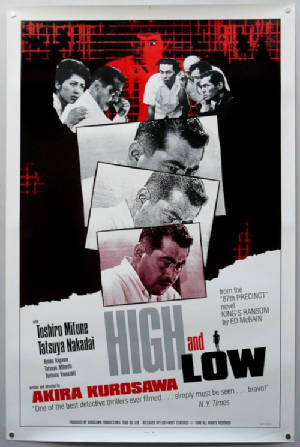|
|
 |
|

(1963, directed by Akira Kurosawa)
- inducted 2017 –
“There's anger in Akira Kurosawa's post-war films. High and Low (1963), an adaptation of the American pulp novel
King's Ransom, is arguably the director's most Western film. It's also one of his most furious. His rage, pure and
unrelenting in 1960's The Bad Sleep Well, was still simmering away in High and Low three years later. Kurosawa
set out to once again skewer the inhumanity of big business, positioning Kingo Gondo (Toshiro Mifune) as a modern version
of the cold-hearted skyscraper honchos of the American pre-Code era. As Gondo plots a nasty corporate takeover, his boy Jun
and friend Shinichi dress up as cowboys and play with their fake six-shooters, just one of many bitter examples of the infiltration
of American culture on post-war Japan.
“Gondo gets a call announcing Jun has been kidnapped for an enormous ransom, enough to ruin his long-planned takeover
bit. But the kidnapper's ambition is overpowered by his ineptitude: he's taken the wrong kid, the son of Gondo's chauffer,
a man who can't possibly afford to pay any kind of ransom that would be worth his while.
“Still, a villain's gotta villain, and in a stroke of grotesque genius, the kidnapper realizes both the law and the
power of the press are on his side. Gondo can't possibly refuse to pay the ransom for someone else's son, not unless he wants
to weather a lifetime of scorn and loss of a carefully crafted reputation. The thing is, Gondo considers it, really
considers it; after all, it's not his kid.
“What follows is an exciting thriller-slash-police procedural, a real nail-biter of a yarn that's all the more remarkable
in light of Kurosawa's meticulous planning, framing and choreography. High and Low is so heavily micromanaged that
by all rights it should be dull and plodding, but Kurosawa is a master of cinematic control. He's so confident that he tells
the audience flat out that this is a railroad plot: the first act's finale is announced with the roar and howl of a speeding
train.
“Stiff-shouldered, his constant anger barely contained, Gondo grew up poor and worked his way to the literal top of
the town. As he stalks around his expansive, luxurious home, he often opens the large sliding glass doors and surveys the
shacks beneath him. Does the smell of the city remind him of his past? Does he hear in the faraway sirens the shrieks of the
damned?
“Kidnapper Ginjiro Takeuchi (Tsutomu Yamazaki) lives somewhere out there in the clutter of poverty, a cheap pair of
binoculars giving him an unbearable glimpse into the opulent world above. Gondo and Takeuchi have been each other's reflections
for a very long time, even if they didn't know it, always looking at the other through the soft distortion of glass. Kurosawa
doesn't set them up as opposites exactly, nor as two halves of the same whole, but as tangible human reminders that there
is precious little difference between good and evil.”
~ Stacia Jones
|
 |
|
Original title: Tengoku to Jigoku
Principal cast: Toshiro Mifune, Tatsuya Nakadai, Kyoko Kagawa, Tatsuya Mihashi, Isao Kimura, Kenjiro Ishiyama, Takeshi Kato,
Takashi Shimura
Screenplay by: Hideo Oguni, Ryuzo Kikushima, Eijiro Hisaita, Akira Kurosawa
Based on the novel King’s Ransom by Evan Hunter (writing as “Ed McBain”)
Produced by: Ryuzo Kikushima, Tomoyuki Tanaka
Associate producer: Akira Kurosawa
Cinematography by Asakazu Nakai, Takao Saito
Production design by Yoshiro Muraki
Costume design by Miyuki Suzuki
Original music by Masaru Sato
Sound by Fumio Yanoguchi, Hisashi Shimonaga (sound mixer), Ichiro Minawa (sound effects editor)
Japan
Duration: 143 minutes
Languages: Japanese
Filmed in black and white with color inserts
Sound mix: 4-Track Stereo (Westrex Recording System)
Cinematographic process: Tohoscope (anamorphic)
Aspect ratio: 2,35:1
Printed film format: 35mm
Produced by Kurosawa Production Co. and Toho Company
Released in USA by Continental Distributing
Premiered in Japan on March 1, 1963
USA release date: November 26, 1963
Awards and honors:
- Venice Film Festival, 1963: Golden Lion (nominated)
- Golden Globes, 1964: Best Foreign Film (nominated)
|
 |
|
|
 |
|
|
 |
|
|
|
|
|
|
 |

